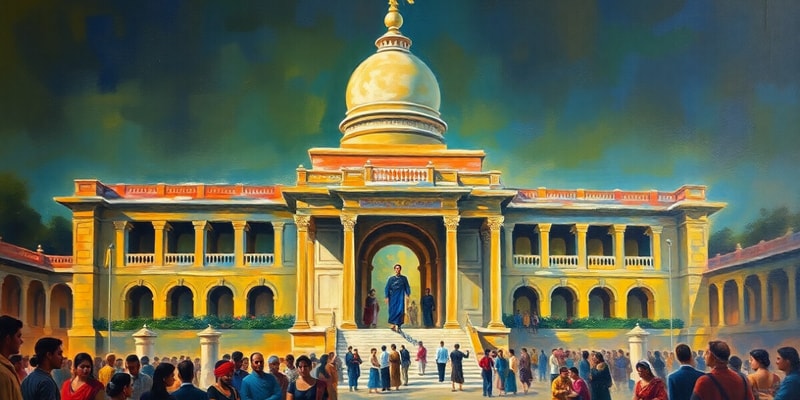Podcast
Questions and Answers
Which organ is considered the upper house of the Parliament of India?
Which organ is considered the upper house of the Parliament of India?
How many representatives of States and Union Territories are there in the Council of States?
How many representatives of States and Union Territories are there in the Council of States?
Who nominates individuals with special knowledge or practical experience in various fields to the Council of States?
Who nominates individuals with special knowledge or practical experience in various fields to the Council of States?
Which body is considered the Supreme in the Indian Constitution?
Which body is considered the Supreme in the Indian Constitution?
Signup and view all the answers
In India, can laws passed by the Parliament be declared unconstitutional?
In India, can laws passed by the Parliament be declared unconstitutional?
Signup and view all the answers
What is the upper house of the Parliament of India?
What is the upper house of the Parliament of India?
Signup and view all the answers
How many individuals are nominated by the President to the Council of States based on special knowledge or practical experience?
How many individuals are nominated by the President to the Council of States based on special knowledge or practical experience?
Signup and view all the answers
In India, where is the power vested to declare laws passed by the Parliament unconstitutional?
In India, where is the power vested to declare laws passed by the Parliament unconstitutional?
Signup and view all the answers
According to the Indian Constitution, is the Constitution considered a sovereign body?
According to the Indian Constitution, is the Constitution considered a sovereign body?
Signup and view all the answers
In which country can laws passed by the Parliament not be declared unconstitutional?
In which country can laws passed by the Parliament not be declared unconstitutional?
Signup and view all the answers
Study Notes
Parliament of India
- The upper house of the Parliament of India is called the Rajya Sabha (Council of States).
- The Rajya Sabha comprises representatives from States and Union Territories, totaling 245 members.
- The President of India nominates 12 individuals to the Rajya Sabha, recognized for their special knowledge or practical experience in various fields.
Constitution of India
- The Supreme body in the Indian Constitution is the Constitution itself, as it establishes the fundamental principles and framework of governance.
- Laws passed by the Parliament can be declared unconstitutional by the judiciary, particularly the Supreme Court of India.
- The power to declare these laws unconstitutional is vested in the judiciary, emphasizing its role in upholding the Constitution.
Sovereignty and Parliament
- The Indian Constitution is considered a sovereign document, with the authority to govern the country derived from its provisions.
- In some countries, laws passed by the Parliament cannot be declared unconstitutional, indicating the supremacy of parliamentary sovereignty in those systems.
Studying That Suits You
Use AI to generate personalized quizzes and flashcards to suit your learning preferences.
Description
Test your knowledge of the Indian Parliament and its structure with this quiz. From the House of the People to the role of the President, this quiz covers key aspects of the Indian parliamentary system and the Constitution.




